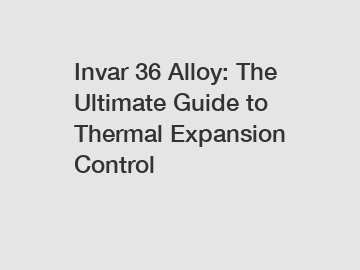Your Position: Home - - Invar 36 Alloy: The Ultimate Guide to Thermal Expansion Control
Invar 36 Alloy: The Ultimate Guide to Thermal Expansion Control.
When it comes to controlling thermal expansion in high-precision applications, Invar 36 Alloy stands out as the ultimate solution. This unique material offers a combination of low thermal expansion and high mechanical strength, making it ideal for use in a wide range of industries, from aerospace and defense to electronics and automotive.
In this comprehensive guide, we will explore the key properties and applications of Invar 36 Alloy, as well as its benefits and considerations for use in various industries.

What is Invar 36 Alloy?
Invar 36 Alloy is a nickel-iron alloy with a nominal composition of 36% nickel and the balance iron. It was developed in the early 20th century by Swiss scientist Charles Edouard Guillaume, who won the Nobel Prize in Physics in 1920 for his work on the material.
One of the defining properties of Invar 36 Alloy is its extremely low coefficient of thermal expansion, which is approximately one-tenth that of carbon steel. This means that Invar 36 Alloy does not expand or contract significantly when exposed to changes in temperature, making it highly stable and predictable in its dimensions.
In addition to its low thermal expansion, Invar 36 Alloy also exhibits excellent mechanical properties, including high strength and toughness. This combination of properties makes it an ideal material for applications that require tight dimensional control and stability over a wide temperature range.
Applications of Invar 36 Alloy.
Invar 36 Alloy is used in a wide range of high-precision applications where thermal expansion control is critical. Some of the key industries that benefit from the unique properties of Invar 36 Alloy include:
Aerospace and Defense: Invar 36 Alloy is used in aerospace and defense applications where dimensional stability is essential. It is often used in precision instruments, optical systems, and satellite components where thermal expansion can affect performance.
Electronics: Invar 36 Alloy is used in electronics applications such as lead frames, semiconductor packages, and printed circuit boards where dimensional stability is required to ensure proper functioning of electronic components.
Automotive: Invar 36 Alloy is used in automotive applications such as engine components, exhaust systems, and sensors where thermal expansion control is necessary to maintain tight tolerances and performance.
Benefits of Invar 36 Alloy.
Invar 36 Alloy offers a number of key benefits that make it a preferred material for thermal expansion control in high-precision applications:
Low Thermal Expansion: Invar 36 Alloy has an extremely low coefficient of thermal expansion, which allows it to maintain dimensional stability over a wide temperature range.
High Mechanical Strength: Invar 36 Alloy exhibits high strength and toughness, making it capable of withstanding high loads and stresses without deforming.
Excellent Machinability: Invar 36 Alloy is easy to machine and fabricate, allowing for precise manufacturing of complex parts and components.
Corrosion Resistance: Invar 36 Alloy is resistant to corrosion and oxidation, ensuring long-lasting performance in harsh environments.
Considerations for Using Invar 36 Alloy.
While Invar 36 Alloy offers a range of benefits for thermal expansion control, there are some considerations to keep in mind when using this material in applications:
Cost: Invar 36 Alloy is a high-performance material that comes at a premium cost compared to traditional materials. However, the benefits of using Invar 36 Alloy may outweigh the initial investment in terms of long-term performance and reliability.
Fabrication: Invar 36 Alloy has unique properties that require special fabrication techniques and processes. It is important to work with a supplier who has experience and expertise in machining and handling this material.
Temperature Range: Invar 36 Alloy has a limited temperature range in which its low thermal expansion properties are most effective. It is important to consider the operating temperature of the application to ensure that Invar 36 Alloy is the right choice.
In conclusion, Invar 36 Alloy is the ultimate material for thermal expansion control in high-precision applications. With its low coefficient of thermal expansion, high mechanical strength, and excellent machinability, Invar 36 Alloy offers unparalleled dimensional stability and reliability. Whether in aerospace, electronics, automotive, or other industries, Invar 36 Alloy is the material of choice for achieving precision and performance.
To learn more about Invar 36 Alloy and how it can benefit your application, contact a trusted supplier with experience in providing high-quality materials for thermal expansion control. With the right material and expertise, you can ensure the success of your high-precision applications and achieve superior performance and reliability.
Are you interested in learning more about Magnetic Shielding Alloys Material Supplier, Alloy Material Supplier, List of Superalloys Material? Contact us today to secure an expert consultation!
45
0
0
Comments
All Comments (0)